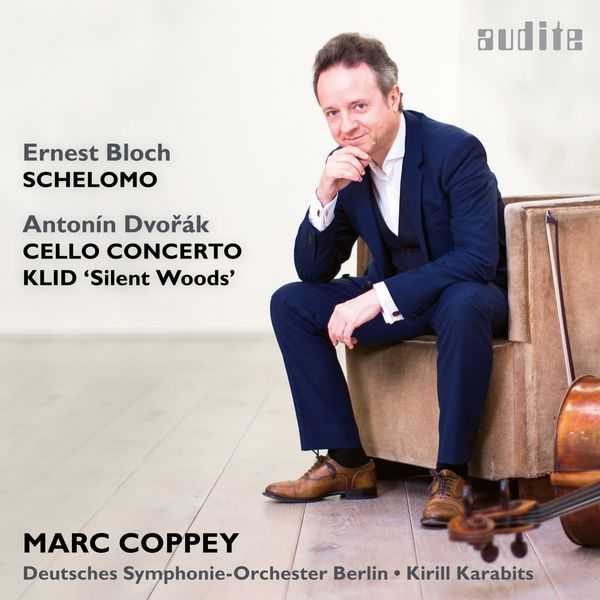

Composer: Ernest Bloch, Antonín Dvořák
Performer: Marc Coppey
Orchestra: Deutsches Symphonie-Orchester Berlin
Conductor: Kirill Karabits
Format: FLAC (tracks)
Label: Audite
Catalogue: AUDITE97734
Release: 2017
Size: 1.18 GB
Recovery: +3%
Scan: yes
01. Bloch: Schelomo
02. Dvořák: Klid, Op. 68, No. 5, B. 182, “Silent Woods”
Dvořák: Cello Concerto in B minor, Op. 104
03. I. Allegro
04. II. Adagio ma non troppo
05. III. Finale. Allegro moderato
Departing from home: in Schelomo, Bloch examines his cultural and religious roots; in his cello concerto, Dvořák illustrates both his old and his new native countries, whilst the forest scene Klid represents a bridge and also an atmospheric reminiscence.
Having spent nearly two decades playing solo recitals and chamber music, as well as performing alongside renowned orchestras, Marc Coppey turns to three classics of the cello repertoire. Following the album of cello concertos by Haydn and CPE Bach, audite now presents its second disc with the French cellist. In all three works, the composers look from Europe to America and vice versa: Bloch’s Schelomo was written immediately before his crossing to America; Dvořák composed his B minor Cello Concerto only once he had arrived there. Klid (Silent Woods) sits in between: before departing for America, Dvořák arranged this work, originally for piano duet, for cello and piano, to be played during his farewell tour. In this format, the piece became so popular that he went on to produce an additional version for cello and orchestra.
Antonín Dvořák and Ernest Bloch provide clear performing instructions, but also demand a high degree of free interpretation. Marc Coppey manages to realise both of these aspects, maintaining a convincing balance and communicating intensively with the orchestra. He does not need to demonstrate his virtuosity through overly hasty tempi: instead, he follows the recommendations found in the scores. This greatly benefits the clarity, vividness and eloquence of his interpretations. The Deutsches Symphonie-Orchester Berlin and Kirill Karabits prove congenial partners.
Any number of recordings on the market of Dvorak’s Cello Concerto in B minor, Op. 104, make good choices: it’s a beloved repertory work, and it is the lifetime chance for any cellist to shine. Nevertheless, there’s a strong case for choosing this one by the respectably well-known, but not a household-name, French cellist Marc Coppey and the Deutsches Symphonie-Orchester Berlin under Kirill Karabits. First is the unusual pairing with Ernest Bloch’s Schelomo, another prominent repertory work for the cello. As Coppey points out in his notes, both works were connected with the U.S.; Bloch’s work was written before he moved to the country permanently, while Dvorak’s concerto was written in the U.S. as the composer prepared to return home. Both are reflections on ethnicity, and they fit well together in unexpected ways. Dvorak’s short tone poem Klid (Silent Woods) is a pleasant entr’acte. But the prime attraction is the Dvorak concerto itself: Coppey offers a full-blooded, passionate reading that may put the listener in mind of classic Czech performances by Janos Starker, for example. Sample the finale, where the maximum intensity is squeezed out of the rhapsodic ending. It’s a virtuoso performance with fine coordination between orchestra and soloist. Highly recommended.